Archive
05 November 2024
Early attempt at colour photography discovered
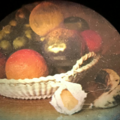
Delft University of Technology has unearthed six glass slides (1890 – 1910), which represent one of the earliest attempts at colour photography. The slides were found during an inventory conducted by the Programme Tailor-Made Approach to Faculty Collections at the Imaging Physics department of the Faculty of Applied Sciences. To view the images, technician Thim Zuidwijk reconstructed a diffraction chromoscope, revealing vivid depictions of a vase with a floral motif and a still life of a fruit basket alongside a banana and a wrapped citrus fruit.
31 October 2024
Bachelor students develop model to better understand the chemical process of renewable fuels

A group of TU Delft bachelor students has developed, as part of the students’ minor in Computational Science and Engineering, a new model that accurately predicts the molecular properties of alkanes. This knowledge is crucial for the development of renewable fuels.
28 October 2024
TU Delft and Urenco invest together in nuclear talent

Uranium enricher Urenco and TU Delft are teaming up to develop new generations of nuclear scientists. Urenco is supporting the Delft Excellent Laboratory Facilities for Innovation and Nuclear Education (DELFINE) programme for three years to increase the pool of nuclear talent who can work to find solutions to the challenges society faces.
28 October 2024
Revolutionary terahertz spectrometer: a step forward in space observation
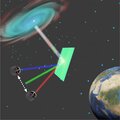
Researchers at Delft University of Technology (TU Delft), in close collaboration with SRON Netherlands Institute for Space Research and LongWave Photonics LLC, have achieved a breakthrough in terahertz spectroscopy—a vital technology to study galaxies, stars, and planetary formation. They created a centimeter-sized, lightweight terahertz spectrometer that could replace traditional half-meter-sized, bulky, and heavy spectrometers in future space observatories. The new device could significantly reduce costs and offer greater flexibility in launching, making these space observatories more affordable and feasible. The innovation is published in Laser & Photonics Reviews.
24 October 2024
Caroline Paul receives KNCV Gold Medal 2024

Caroline Paul, Associate Professor at Delft University of Technology, receives the KNCV Gold Medal 2024. She is awarded the prestigious Dutch scientific award as a chemist under the age of 40 who has already demonstrated scientific excellence and from whom much is expected in the coming years. The award will be awarded on 3 December during the NWO CHAINS chemistry conference in Veldhoven, The Netherlands.
24 October 2024
Eight leading researchers receive Vidi-grant
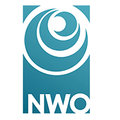
NWO has awarded 102 researchers a Vidi grant in total 86,7 million euros. Eight promising TU Delft researchers from the domains Exact and Natural Sciences (ENS), Social Sciences and Humanities (SSH) and Applied and Technical Sciences (ATS) have been awarded. This Vidi grant up to 850,000 euros will enables the laureates to develop an innovative line of research over the next five years and further expand their own research group.
17 October 2024
TU Delft Research Reactor ready for faster research

Over the past few years, a team of scientists and technicians from the TU Delft Reactor Institute have been working on a large-scale upgrade and modernisation of the Delft reactor. The result is a state-of-the-art facility where researchers and students from around the world can now conduct faster and more advanced research. The milestone was officially celebrated on Thursday 17 October 2024.
17 October 2024
TU Delft researchers provide part of the puzzle to produce alternatives for fossil fuels
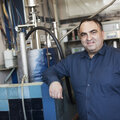
In the quest to develop synthetic oils and fuels, TU Delft has successfully produced an in-situ cell that aids in understanding the process of catalysts. This achievement is part of research conducted in collaboration with Eindhoven University and the National Institute of Clean and Low-Carbon Energy.
11 October 2024
Delft scientists discover how innate immunity envelops bacteria
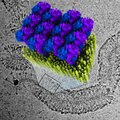
The protein GBP1 is a vital component of our body’s natural defence against pathogens. This substance fights against bacteria and parasites by enveloping them in a protein coat, but how the substance manages to do this has remained unknown until now. Researchers from Delft University of Technology have now unravelled how this protein operates. This new knowledge, published in Nature Structural & Molecular Biology, could aid in the development of medications and therapies for individuals with weakened immune systems.
10 October 2024
Natalia Vtyurina winner Marina van Damme Grant 2024

On Thursday 10 October, Delft University Fund organised the 2024 Marina van Damme Grant Award Ceremony. Three female Delft alumni stood the chance to win the coveted grant of € 9,000,-. After three impressive pitches and a short jury meeting, Prof. Marina van Geenhuizen, chair of the jury, announced that it was Natalia Vtyurina for winning the 2024 Marina van Damme Award!